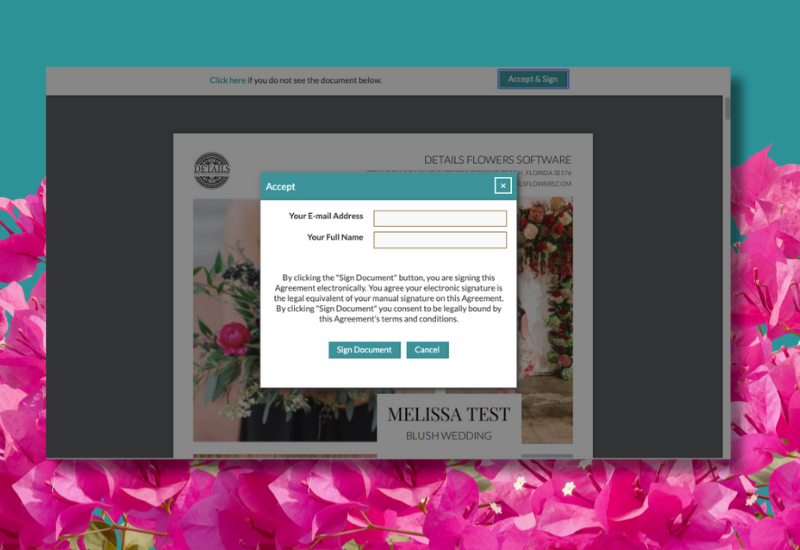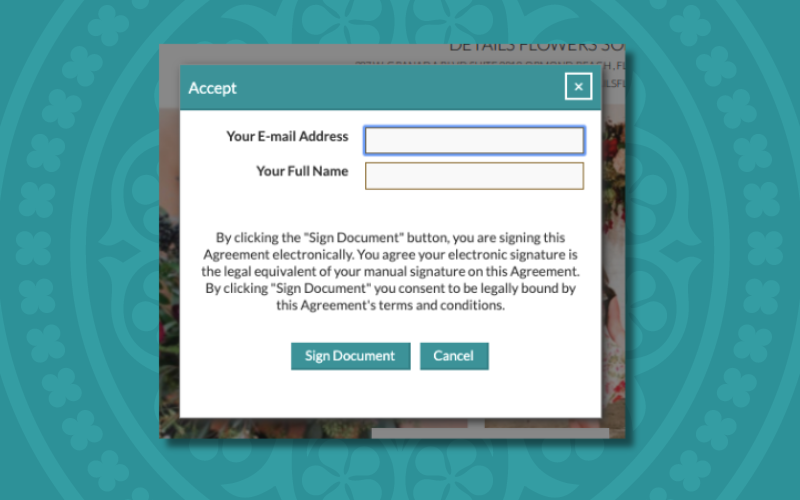
A solid contract is an important aspect of being a successful event florist. Our booking percentages increased when we had a contract that promoted our professionalism with a great layout, colorful imagery, and great descriptions. The client always feels more secure knowing that they've hired a professional, and we've felt secure knowing we had a legal document securing our business.
But how do you know when a contract is properly in place, and the terms are agreed upon?
The signature is the most common way to indicate that a client has read the contract terms and agreed to the event details. Even if one's signature is so unique and stylized as to be virtually illegible, it's always essential to obtain a signature. But what about e-signature? As we enhance our features, this has become a "hot topic" and a desired feature for busy floral artists. Moving into paperless electronic formats is essential as our contracts continue to develop. The criteria for a signed agreement and "signature" have been substantially broadened.
In our research, whichever form the signature takes, the most crucial element in the signature is proof that an offer has been considered and accepted. There are a few rules to help determine whether a signature is valid or if a signature is even necessary.
What's in a valid signature?
Typically, a signature is merely someone's name written in an elegant, stylized fashion. However, that is a formality and not really a necessary piece. The only thing that needs to be noted is a mark representing YOU. It can be a series of squiggles or even an "X" for people who can't read and write. As long as this signature adequately records the parties' intent in a contractual agreement, it's considered a valid signature.
The signature can be made by anything that marks the paper. A pencil is not favored because it can smudge and be erased, but a signature made with a pencil is equally valid as a signature in a pen. Signatures can also be made with stamps or electronic means since these are all forms of writing implements. And if you cannot sign a contract yourself, you can always give someone 'an agent' the authority to sign for you on your behalf.

Electronic Signatures and the E-SIGN Act
In 2000, federal lawmakers passed the Electronic Signatures in Global and National Commerce (E-SIGN) Act because of the high request to move to digital signing contracts. This law recognizes the validity of electronic contracts and signatures as having the same force of law as paper-based counterparts. Since it is federal law, it affects all contracts considered to engage in interstate commerce, but keep in mind some states often have laws about electronic signatures-- so be sure to check the laws in your state.
The law also allows individuals to choose a paper contract (or otherwise non-electronic) document instead, so be sure to provide a paper copy if requested. The digital PDF download is an alternate version to get their signature the old-fashioned way. Consumers must be allowed to "consent electronically, in a manner that reasonably demonstrates that the consumer can access information in the electronic form that will be used to provide the information that is the subject of the consent."
Are signatures required? Yes or No?
Sometimes, signatures aren't even required to have a contract valid. A simple assent from your email account may also be considered a "signature" because it indicates your agreement to something.
Whether you sign a document digitally, via email, or on paper, courts will consider whether you made the "signature," intended to make the signature, and intended the signature to signify your agreement to the contract. If the court can find these three things, it will consider your contract binding.
Not Sure About the Validity of a Signature?
Whether it's an elegant signature, an e-signature, or a simple "x," a good florist will want to ensure the signatures on your contracts and agreements are valid. If you have questions about entering into a legally enforceable contract with your clients, you should talk to a small business attorney in your area and confirm how you should regularly conduct business and what works for your state.
Follow Details on Instagram!